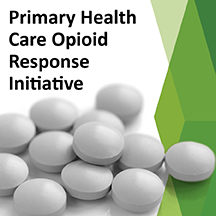The start of this year has already seen many milestones regarding the Primary Health Care Opioid Response Initiative (PHC ORI). The partners on this grant-funded project: The Alberta College of Family Physicians (ACFP), Alberta Medical Association (AMA), Alberta Health Services (AHS), Patients Experience Evidence Research (PEER), and Primary Care Networks, together with Alberta Health have been collaborating and implementing deliverables for the primary care response including:
• Simplified Guideline for Opioid Use Disorder in Primary Care – This guideline, created by PEER, provides evidence-based research for shared, informed, decision-making on Opioid Use Disorder (OUD) in primary care. Look for them in the May edition of Canadian Family Physician.
• Opioid Change Packages – The Opioid Change Packages, created by the AMA, focus on how to support practices with process improvements and key high leverage changes that will support them in “how” they can optimize their care and experience for patients on opioids. During the month of April, the AMA is offering Opioid Change Package training to support coordinating care within and outside of primary care teams. Sign up today here.
• Harm Reduction Module for Primary Care – The Harm Reduction Module for Primary Care includes evidence-based strategies for supporting a harm reduction approach within primary care settings, including recommended practices for reducing the experience of bias and stigma faced by People Who Use Drugs, their families, and other individuals with lived experience of opioid use.
The module is intended for a broad multi-disciplinary audience including physicians, nurse practitioners and other health care providers working in primary care. It will build on foundational principles of harm reduction and work already accomplished through the process of revising the AHS Harm Reduction Policy.
• Collaborative Mentorship Networks (CMN) for Chronic Pain and Addiction – The CMN connects family physicians with colleagues who have experience and expertise in treating pain and addiction, providing an environment that is safe to share concerns and seek support.
For more information visit our Opioid Response in Primary Care page.

